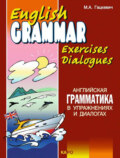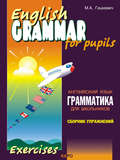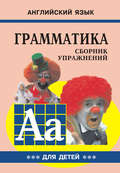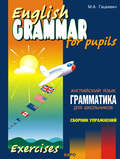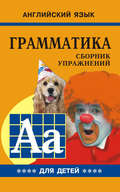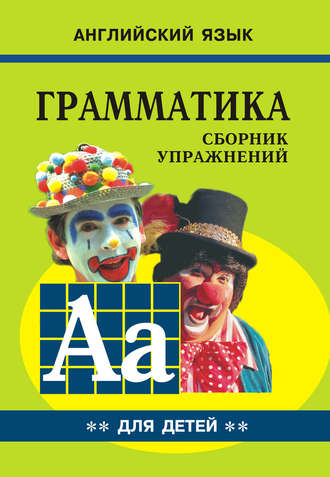
Марина Гацкевич
Грамматика английского языка для школьников. Cборник упражнений. Книга II
5. She … a new dress now.
is buying, buys, bought
64. Choose the correct item.
1. I … a cup of coffee ten minutes ago.
am drinking, drink, drank
2. We usually … bananas for lunch.
eat, ate, are eating
3. Kate and Mike … at the birthday party right now.
are dancing, danced, dance
4. My little sister … supper two hours ago.
is having, has, had
5. They … shopping the other day.
don’t go, aren’t going, didn’t go
65. Choose the correct item.
1. The sun … now.
is rising, rose, rises
2. My grandmother … education at home many years ago.
gets, got, is getting
3. James always … with the window open.
is sleeping, slept, sleeps
4. She … washing yesterday.
isn’t doing, didn’t do, doesn’t do
5. Mike often … in the garden helping his mother.
is working, works, worked
66. Choose the correct item.
1. He … to school by car now.
got, gets, is getting
2. The children … cartoons yesterday evening.
don’t watch, aren’t watching, didn’t watch
3. Julia always … in the sun at the seaside.
is lying, lies, lay
4. I … a novel by Mark Twain last year.
read, am reading, read [red]
5. It … last week.
doesn’t snow, isn’t snowing, didn’t snow
67. Choose the correct item.
1. My sister … in for skating last winter.
goes, went, is going
2. Jane … now.
paints, painted, is painting
3. She … on the computer last week.
doesn’t work, didn’t work, isn’t working
4. My mother always … the truth.
is telling, told, tells
5. He … from Greece twenty years ago.
came, comes, is coming
68. Open the brackets.
1. You (to go) to the cinema yesterday?
2. When she (to get up) yesterday morning?
3. Why Jill (not to go) to school last week?
4. With whom David (to play) football at the stadium the day before yesterday?
5. How much money you (to spend) yesterday?
6. Where they (to have dinner) yesterday afternoon?
7. How many lessons we (to have) yesterday?
8. Your sister (to watch) TV yesterday evening?
9. Where he (to live) last year?
69. Open the brackets.
1. What you (to do) yesterday evening?
2. When Ben (to come) home the day before yesterday?
3. You (to go) to the swimming pool yesterday?
4. Who (to cook) dinner for you last week? 5. What game they (to play) at the stadium yesterday?
6. How often your sister (to visit) her Granny last month?
7. What Mike (to have) for supper yesterday?
8. You (to take) your medicine yesterday evening?
9. When Bat (to go) to school yesterday morning?
70. Open the brackets.
1. You (to listen) to the radio yesterday morning?
2. They (to go) for a walk yesterday afternoon?
3. Why you (not to help) your Granny about the house yesterday?
4. What Tom and Billy (to have) for lunch yesterday?
5. You (to go) to the country last summer?
6. With whom your father (to play) chess yesterday evening?
7. Your friends (to go) to the circus last week?
8. Why Colin (not to go) shopping yesterday?
9. Jane (to send) a telegram yesterday?
71. Open the brackets.
1. Who (to cry) in the kitchen five minutes ago?
2. When you last (to talk) on the phone?
3. She (to write) a letter to her Granny last month?
4. How many times you (to go) to the theatre last year?
5. Why Jack (not to take) a shower yesterday morning?
6. Your dog (to bark) in the garden yesterday evening?
7. How much meat you (to buy) yesterday?
8. They (to drink) Coca Cola two hours ago?
9. Where they (to go) the day before yesterday?
72. Open the brackets.
1. Where Carol (to work) five years ago?
2. He (to sleep) on the sofa yesterday?
3. When Kate last (to sweep) the floor?
4. Who (to open) the window two hours ago?
5. What book she (to read) last month?
6. Which of your friends (to go) to London last year?
7. She (to water) the plants in the kitchen garden yesterday?
8. Why Fred (not to swim) in the pond yesterday morning?
9. With whom you (to go) to the disco club last week?
73. Open the brackets.
1. When Alice last (to put on) her new dress?
2. You (to buy) sweets yesterday?
3. When you (to come) home yesterday?
4. They (to help) their Granny about the house last week?
5. What your cat (to eat) yesterday?
6. How often you (to eat) bananas last summer?
7. Why he (not to study) hard last year?
8. Where Helen and Fred (to play) tennis last week?
9. How many books Liz (to read) last month?
74. Answer the questions using the words in brackets.
Example:
Why didn’t Sally do her homework yesterday? (to be ill)
Because Sally was ill yesterday.
1. Why didn’t you read an English book yesterday? (to learn the poems by heart)
2. What did Sue do the day before yesterday? (to go to the theatre)
3. Did it rain yesterday afternoon? (to snow)
4. What did Mike do in the hall five minutes ago? (to take off his shoes)
5. Why didn’t they go to the country last Saturday? (to rain)
6. Did your friend listen to the concert on the radio? (to watch TV)
7. Why didn’t George make a phone call yesterday evening? (to sleep)
8. What did you do near the monument an hour ago? (to take pictures)
9. Did your grandfather listen to the radio yesterday evening? (to talk with Granny)
75. Answer the questions using the words in brackets.
1. Did Sam go to the party last Sunday? (to leave St. Petersburg for Moscow)
2. Why did the baby cry yesterday morning? (to be ill)
3. Did Carol play tennis at the stadium the other day? (to play rugby)
4. What did Liz do yesterday evening? (to watch TV)
5. Did he work in the garden the other day? (to play chess)
6. What didn’t you do yesterday? (to study English)
7. Why didn’t Nan do her homework last week? (to go to the concert)
8. What did she do in the kitchen two hours ago? (to make a cake)
9. What did they do yesterday evening? (to go to the circus)
76. Answer the questions using the words in brackets.
1. Did Helen cook breakfast yesterday morning? (to read a book)
2. Why didn’t Jack go to the swimming pool last Monday? (to read a book)
3. What did your friends do yesterday? (to walk about St. Petersburg)
4. Did she go to the cinema yesterday afternoon? (to write a letter)
5. What did Susan do in the kitchen yesterday evening? (to wash up)
6. Why didn’t you go to school last week? (to be ill)
7. Did Alice wash the floor yesterday? (to make a dress)
8. What did they do last Monday? (to study Maths)
9. Did you have an English lesson yesterday? (to walk about the city)
77. Ask and answer the questions using the words in brackets.
Example:
What did Mike do yesterday? (to go/to the country)
He went to the country yesterday.
1. Why didn’t he watch TV yesterday? (to do/homework)
2. Where did they go last week? (to go/to Spain)
3. What did the child eat for breakfast yesterday morning? (to eat/porridge)
4. Why didn’t Jim play table tennis last Saturday? (to run/at the stadium)
5. How many times was Susan ill last year? (to be ill/three times)
6. Who wrote the story The Prince and the Pauper? (Mark Twain/to write)
7. When did your friends live in Scotland? (to live/in 1990)
8. Why didn’t you buy a new car last summer? (to buy/a new house)
78. Ask and answer the questions using the words in brackets.
Example:
Where did she work many years ago? (to work/in a bank)
She worked in a bank many years ago.
1. Why didn’t David ring me up yesterday evening? (to play badminton/at the sports ground)
2. How many times did Linda run a race last year? (to run a race/five times)
3. When did Mary leave home for work yesterday morning? (to leave/at seven o’clock)
4. Why didn’t she read newspapers the day before yesterday? (to wash/clothes)
5. Who drove Liz to the theatre the other day? (her husband/to drive)
6. When did you listen to that play on the radio? (to listen/last Saturday)
7. Why didn’t John go to the cinema last Sunday? (to write/a composition)
79. Read a sentence about the present and then complete a sentence about the past.
1. We usually have dinner at three o’clock. Yesterday …
2. I always take a shower twice a day. Yesterday …
3. My elder brother often takes a shower twice a day. Yesterday …
4. Helen always cleans the room in the morning. Yesterday …
5. They usually play football at the stadium. Last week …
6. Her parents usually come home at seven o’clock. Yesterday …
7. My father always gets up at six o’clock. Yesterday …
8. Mary usually has cabbage soup for dinner. Yesterday …
9. I always make the bed in the morning. Yesterday …
80. Read a sentence about the present and then complete a sentence about the past.
1. I always go for a walk in the afternoon. Yesterday …
2. They usually spend their summer holidays at the seaside. Last summer …
3. I often read books in the sitting room. Yesterday …
4. My friend sometimes does his morning exercises on the balcony. Yesterday morning …
5. Sam usually makes tea for breakfast. Yesterday morning …
6. We always have breakfast at 8 o’clock. Yesterday …
7. My Granny usually goes to bed early. Yesterday …
8. Kate usually takes her dog for a walk twice a day. Yesterday …
9. His brother always works on the computer in the evening. Yesterday …
81. Read a sentence about the present and then complete a sentence about the past.
1. I usually ride a bicycle in the park. Yesterday …
2. They usually have six lessons a day. The day before yesterday …
3. My grandfather often reads newspapers. Yesterday …
4. Jane always helps her mother about the house in the afternoon. Yesterday …
5. We always visit our Granny on Sunday. Last week …
6. He often buys vegetables for supper. Yesterday …
7. She usually washes the floor in the morning. Yesterday …
8. My grandparents always go to the country in summer. Last summer …
9. The pupils usually do their homework in the afternoon. Yesterday …
82. Make up sentences from the words.
1. didn’t, to the bank, Dave, go, the other day.
2. five minutes, he, came in, ago.
3. for, yesterday, my cat, I, looked.
4. yesterday, Sally, her friend, phoned, four times.
5. three times, took, she, for a walk, her dog, yesterday.
6. a question, him, I, ask, didn’t.
7. went, Sue, last week, on holiday, to Spain.
8. didn’t, Jim and George, the tram, yesterday, catch, morning.
9. last summer, lived, we, on the bank, in a little house, of the river.
83. Make up sentences from the words.
1. twenty, got, ago, my parents, married, years.
2. left, my, ten minutes, I, slippers, ago, here.
3. painted, last year, the house, we.
4. on a business, his father, went, trip, last week.
5. at the theatre, the children, many, ate, sweets, yesterday morning.
6. Helen, last year, loved, Billy.
7. missed, yesterday, we, the bus, morning.
8. worked, his grandmother, in the library, five years ago.
9. ate, a pizza, yesterday, they, for dinner.
84. Make up sentences from the words.
1. had, yesterday, a party, Mary, evening.
2. twenty minutes, your mother, ago, left, a message, for you.
3. a new carpet, bought, last week, we.
4. met, at the theatre, her, the day before yesterday, he.
5. went, to Australia, last year, they.
6. didn’t, stay, last summer, we, at a hotel.
7. to the dentist’s, he, didn’t, last year, go.
8. bought, last month, my friend, new, a, car.
9. repaired, last week, his, Billy, bicycle.
85. Make up questions from the words.
1. at a hotel, Mike, did, last summer, stay?
2. you, understand, didn’t, the exercise, yesterday?
3. did, buy, Alice, where, red, beautiful, a, dress?
4. didn’t, play, why, yesterday, you, the piano?
5. went, yesterday, who, to the market, afternoon?
6. his brother, why, take, yesterday evening, didn’t, his dog, for a walk?
7. taught, last year, them, who?
8. Colin, last time, when, phone, did, you? 9. looked, Billy, yesterday evening, who, for?
86. Make up questions from the words.
1. go, did, where, Sam, on holiday?
2. Mary, get married, did, last year?
3. you, to the dentist’s, when, go, did, last?
4. did, Charles, at home, yesterday, stay, why?
5. Jill, last week, did, meet, you?
6. didn’t, at the party, Paul, dance, last Sunday, why?
7. yesterday, didn’t, wait, why, you, morning, for us?
8. helped, with, Carol, yesterday, who, her homework?
9. buy, when, Jake, did, the ticket?
87. Make up questions from the words.
1. eat, so many, he, sweets, why, yesterday, did?
2. they, from, did, come, Spain, when?
3. opened, who, yesterday, the windows, evening?
4. last, Willy, when, repair, did, his car? 5. did, A. S. Pushkin, when, die?
6. you, yesterday, didn’t, afternoon, with you, an umbrella, take, why?
7. your parents, when, paint, did, the walls?
8. this boy, last, when, take, did, a shower? 9. five years, where, he, did, ago, live?
88. First read the text, then answer the questions.
Liz and Alice
Liz was eleven. Alice was ten. They were good friends. The girls lived in Paris. They went to school. Liz and Alice were good pupils. Liz played the piano. Alice went in for swimming. After school they usually went for a walk in the park. There the girls played with a ball and ate ice cream. Sometimes they watched the ducks and fed them. In the evening they always did their homework and read interesting books. But last month Liz left for London and Alice left for New York.
1. How old Liz (to be)?
2. How old Alice (to be)?
3. They (to be) good friends?
4. Where the girls (to live)?
5. They (to go) to school?
6. Who (to play) the piano?
7. Who (to go) in for swimming?
8. Where they usually (to go) for a walk?
9. What Liz and Alice (to do) in the park?
10. What they always (to do) in the evening?
11. Where the girls (to go) last month?
89. Open the brackets. Put the verbs into the Present Simple, the Present Progressive or the Past Simple, answer the questions.
George
I (to want) to tell you about a clever boy. His name (to be) George. He (to be) from Germany. George (to be) fifteen. He (to be) a good pupil. George (to be) good at Maths. He (to want) to be a scientist. George (not to go) in for sports. He (not to like) to go for a walk. But George (to like) to study Maths. His mother (to be) a theatre-goer. And yesterday she (to take) George to the ballet. They (to see) Shchelkunchik. George and his mother (to enjoy) the performance greatly and George’s mother (to promise) to take him to the opera at a later date. Now George (to do) his homework. And his mother (to knit).
1. What the boy’s name (to be)?
2. Where George (to be) from?
3. How old George (to be)?
4. He (to be) a good pupil?
5. What George (to be) good at?
6. What he (to want) to be?
7. George (to go) in for sports?
8. What he (to like) to do?
9. His mother (to be) a theatre-goer?
10. Where she (to take) George yesterday?
11. What they (to see) at the theatre?
12. Where she (to promise) to take George at a later date?
13. What George (to do) now?
14. What George’s mother (to do) now?
90. Open the brackets. Put the verbs into the Present Simple, the Present Progressive or the Past Simple, answer the questions.
Sally
I (to want) to tell you about a very beautiful girl. Her name (to be) Sally. She (to be) from Austria. Sally (to be) twelve. She (to be) a pupil. Sally (to go) in for swimming. She (to go) to the swimming pool four times a week. Sally (to like) to swim very much. Yesterday Sally (not to go) to the swimming pool. She (to go) to the party. Sally (to put on) her new blue dress and white shoes. Blue and white (to be) her favourite colours. They (to dance) a lot at the party. Now Sally (to read) a novel by Mark Twain.



